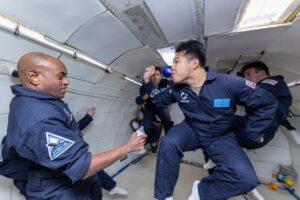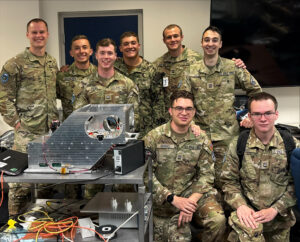Learn more about Air Force ROTC at UGA.
Professional Development Opportunities
As an Air Force ROTC cadet, you’ll have access to developmental experiences that most college students can only imagine. Professional Development Trainings (PDTs) offer hands-on opportunities to explore various Air Force and Space Force career fields, strengthen your leadership skills, and expand your understanding of military operations around the world. These immersive programs typically take place over the summer, with most travel, lodging, and meals fully funded and cadets receive training pay as well.
At Detachment 160, our cadets have taken part in a variety of PDTs, gaining invaluable insight and experience beyond the classroom. From base visits and internships to the Azimuth Space Program, Cadet Cadre, and SOAR our students have participated in a wide range of opportunities that helps shape them into future officers of the Air and Space Forces.
Air Force Academy Freefall (AFAFF)
AFAFF is a 12-day parachute training program that is conducted at the U.S. Air Force Academy (USAFA) in Colorado Springs, Colorado. The course is comprised of strenuous physical training, conditioning, ground school and five free-fall jumps from 4,500 feet above ground level. Cadets completing all five jumps are awarded jump wings.
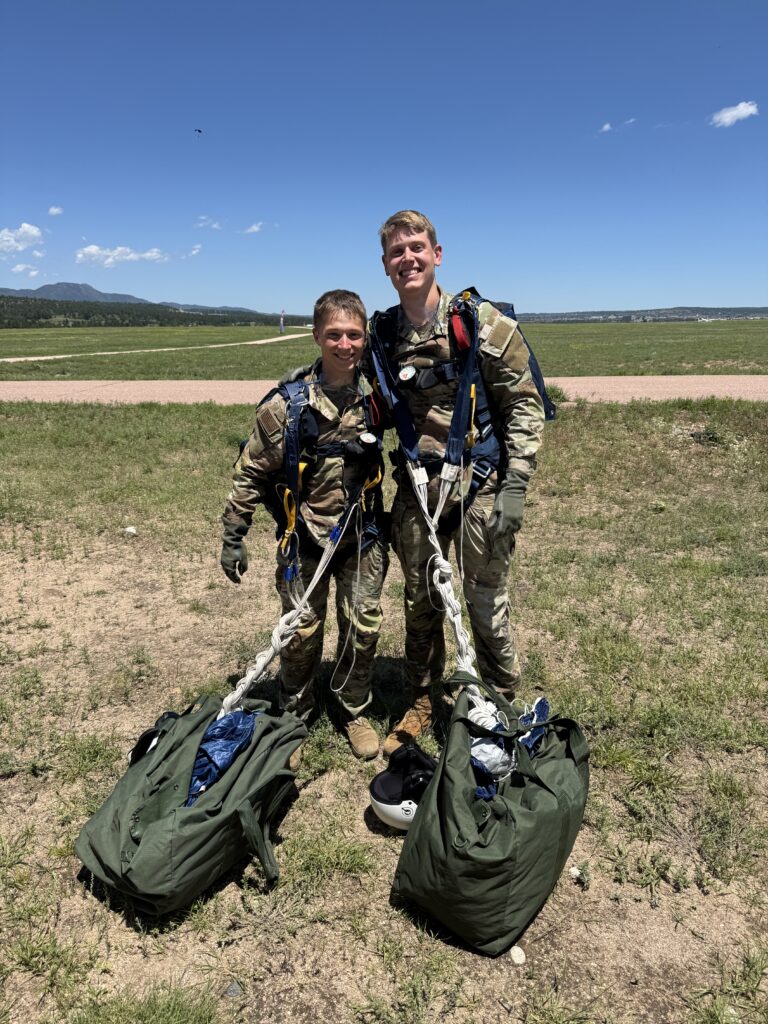 From Cadet Cook, AS400:
From Cadet Cook, AS400:
“This summer I attended the Air Force Academy’s Freefall program. One great aspect of being a Cadet in AFROTC is that we have the opportunity to apply for this. I am so thankful for the time, people, and the experiences I gained while on my trip to Colorado Springs. The training started on a Monday where it was two 12 hour days of non stop ground training. From 0500-1700 every day we were at the Ground Training Facility learning how to enter freefall, how to land our parachute safely on the ground, and most importantly, what to do if something were to go wrong. On Wednesday morning we were taken via bus to IFly, which is a wind tunnel meant to simulate the experiences felt in freefall, after IFly we did practical tests on our general knowledge, and emergency procedures. It is worth noting that the Freefall program is the only program in the country where your first skydive is solo. So my class and I waited for Thursday to come, knowing that we were going to jump out of a plane completely alone, with three days of ground training to prepare for it.
As soon as my name was called for my first jump, reality hit, this wasn’t just playing pretend anymore. I followed my group of other anxious Cadets to the gear-up room where we put on our harnesses with our parachutes, just as we were trained to do. The instructors ran some final checks, then loaded us onto the Twin Otter to climb to 5000 feet above the Air Force Academy. I am still not sure if that climb takes five minutes or 1 hour, but it felt like an eternity. Lucky for me, I was usually the first person out of the airplane. Finally once the aircraft climbs to its altitude, the door opens, and the Jump Master gives the command “STAND IN THE DOOR”, a phrase seen everywhere within the Ground Training Facility, and a moment we practiced hundreds of times, yet somehow once the wind hit my body, it felt like moving a mountain just to get outside of the door. The Jump Master ran my final check, and gave the “GREEN LIGHT, GO” in which I simply stepped outside of the aircraft and let go of the side, just like I was trained to do. Feeling the surge of wind all over my body was a friendly reminder that I was currently falling out of the sky, with no help except for the parachute on my back. I ran through my ten-second sequence, and it was finally time to pull. Thankfully I never ran into any issues, but once I ran my safety checks and realized I was okay, I was gifted with the clearest view of the Rocky Mountains, Pike’s Peak, and the Garden of the Gods that only a few thousand people ever get to see in their lifetime.
I will never forget those crystal clear, obstruction free views that I got, and I am even more thankful that I got to do it four more times after that, where I completed the course and earned my Basic Parachutist wings. Freefall is one of the coolest things I have ever done, along with the most terrifying thing I have ever done. To sit at the edge of an airplane at 100 miles per hour, and tell yourself “yes I want to jump out of this” is truly remarkable. I am very thankful for all of the USAFA Cadets, other ROTC Cadets, and the instructors that I met along this trip, and I hope that every Cadet who wants this opportunity gets it, because it is truly life changing.”
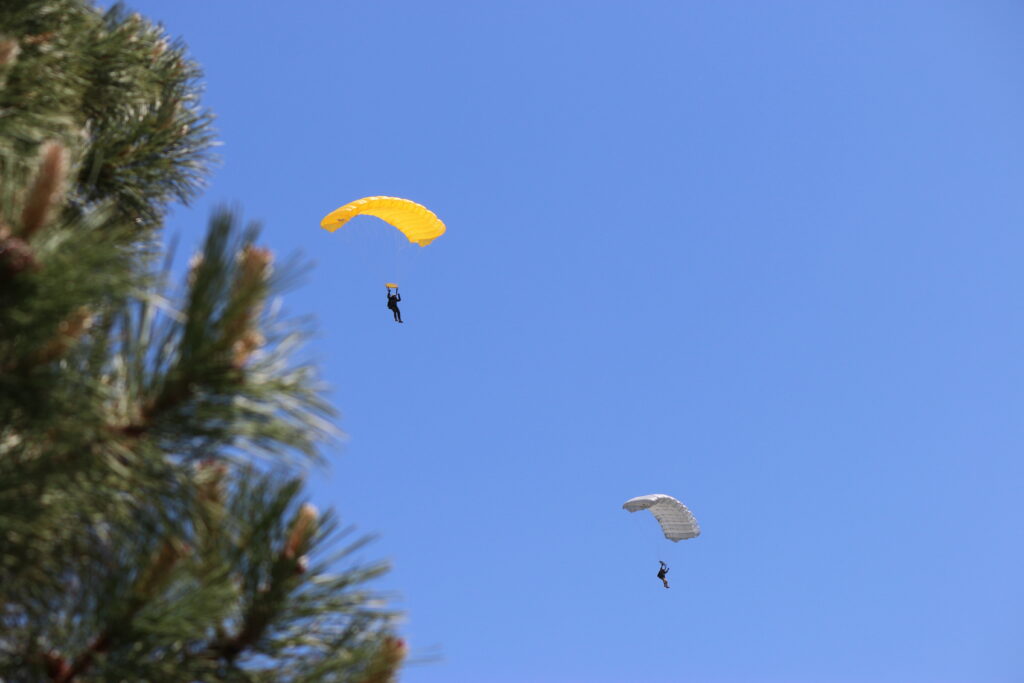
Cadet Training Assistant (CTA) Program
Cadet Training Assistant (CTA) program is comprised of handpicked Professional Office Course (POC) cadets from across the country who work alongside Field Training Officers (FTO) in developing and evaluating cadets throughout the rigors of the 20 day Field Training (FT) program. FT is an integral component of the AFROTC curriculum, designed to test cadets physically, mentally and emotionally. CTAs are expected to assist FTOs as they train, develop and mentor cadets on a wide range of competencies which include: communication skills, wingman culture, team building, critical thinking, adaptability and decision-making. Training days for cadets extend from 0400 to 2000 every day.
From Cadet Abreu AS400: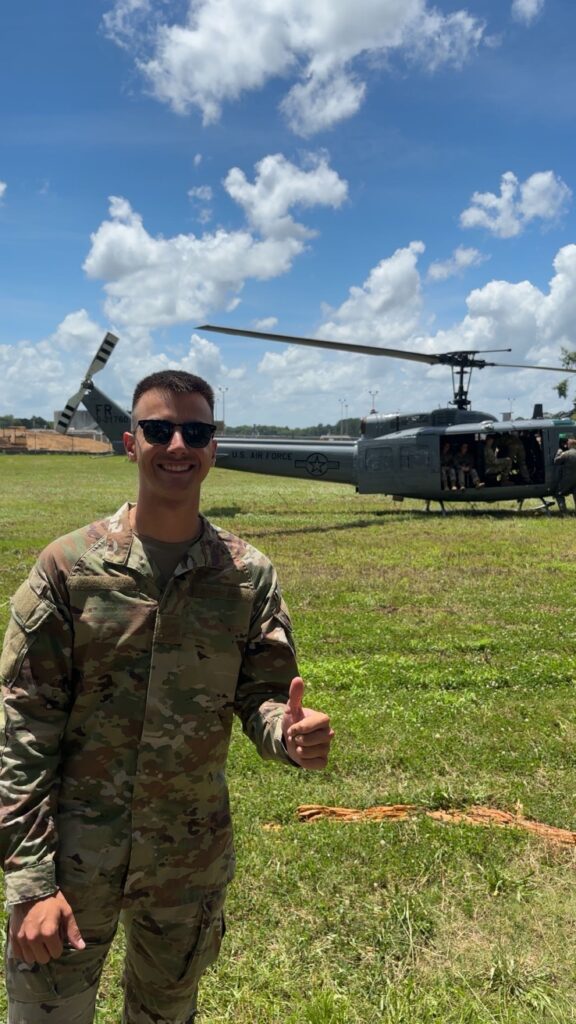
“This summer, I had the chance to return to Maxwell AFB as a Cadet Cadre. I worked alongside 46 other cadets to run a full cadet wing supporting over 1,300 trainees across six weeks of Field Training. My role was part of a brand-new addition to the operation: Standards/Evaluation. As one of the first cadets in this position, I helped shape how evaluations were conducted, ensured consistency across flights, and worked closely with active duty cadre to keep things running smoothly.
Taking on a role with no precedent meant figuring things out as we went. There was no checklist, no template—just a lot of coordination, quick thinking, and trust in the team around me. I had to build systems from scratch, adapt to shifting priorities, and stay flexible when things didn’t go according to plan (which was often).
There were plenty of struggles—early mornings, long days, and more curveballs than I knew what to do with—but my team and I always came out on top. I also had the chance to visit the Alabama Air National Guard and connect with cadets from all over the country. Between the structured chaos and shared struggle, I made some good friends and learned more during my second time at Maxwell than I ever expected.”
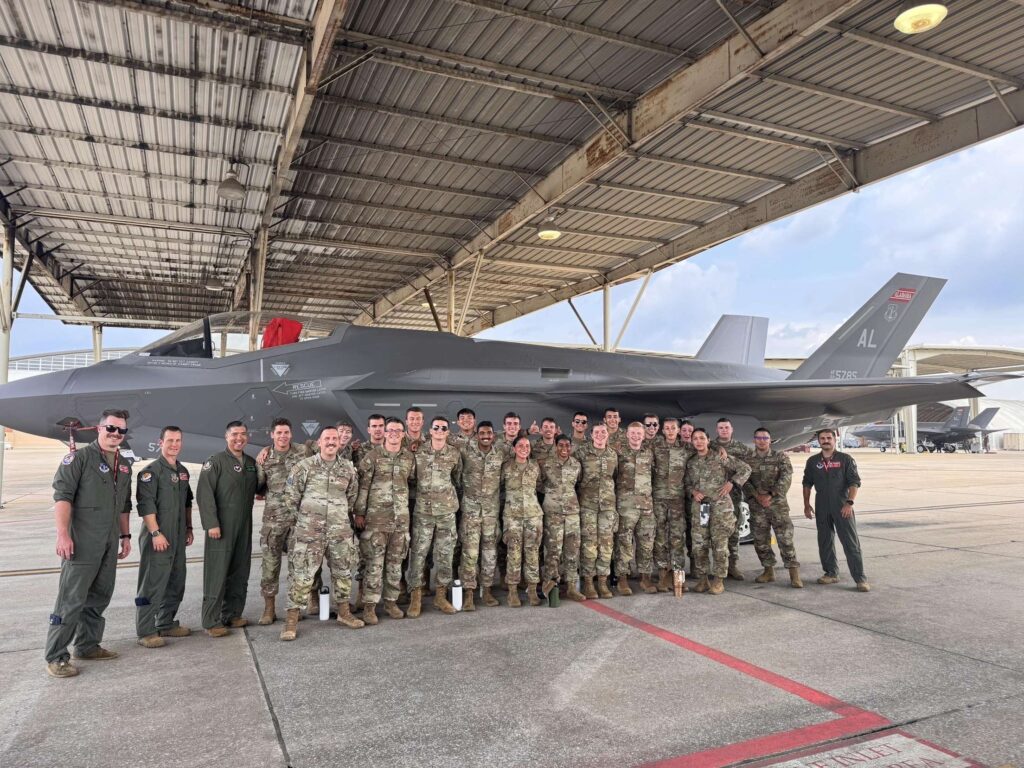
Cyber Camp
This internship is part of a larger effort from the 67 Cyberspace Wing to increase talent within the Cyber Mission Forces (CMF). The Cyber Camp is an opportunity for AFROTC cadets to shadow and assist developers at the 90th COS at their state-of-the art office space in downtown San Antonio, TX.
From Cadet Kim AS400:
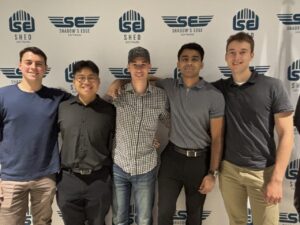
“Cyber Camp gave me a chance to dive into cybersecurity in a hands-on way. Over the course of three days, I worked with four other interns to develop a basic form of malware while following the SCRUM process. It was a challenging but rewarding project that taught me how technical problem-solving, teamwork, and communication all come together in real cyber operations.
We also had the chance to talk with cyber professionals about their careers and the role of cyber in national security, which gave me a clearer picture of the opportunities in this field.
While not in the office, I enjoyed exploring San Antonio with the other interns. Hanging out after long days of work and grabbing good food downtown made the whole week even more memorable.
Cyber Camp gave me a chance to not just learn about cybersecurity, but to experience what it’s like to work on a team, take on real challenges, and apply what I’ve learned to these real challenges. It left me motivated to continue to keep growing in this field and excited for future opportunities.”
Air Force Academy Soaring (SOAR) Program
SOAR is a 15-day program designed to give cadets the opportunity to experience the basic fundamentals of flight in non-powered gliders. The training takes place at the U.S. Air Force Academy (USAFA) in Colorado Springs, Colorado. Cadets receive instruction in basic flight through both ground school and actual flight training, culminating in a solo flight. Participants can expect eight to fifteen flights while spending around five hours each day on the flight line. The program assumes cadets have no previous flight experience.
From Cadet Lachowicz AS200:
“Getting the opportunity to learn how to fly early on in my AFROTC experience was truly amazing! Not only did I get to experience piloting for the first time, but I had the opportunity to actually feel what flying felt like (to really decide if my life-long dream of becoming a pilot was fitting for me). Flying a glider is unlike anything I’ve ever experienced before. It’s equally exciting as it is terrifying because you’re learning to fly without an engine!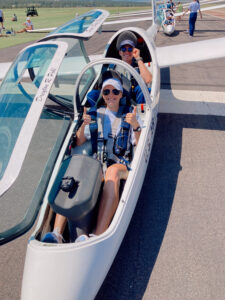
Every day we would spend hours at the airfield, and even if you weren’t flying, you were learning how to tie the tow rope, operating communication channels, or just hanging out with your class. Getting to network with other cadets from around the country and the Air Force Academy was awesome because I got to learn about their experiences as cadets and students from different universities. My friends from SOAR and I still talk to this day!
One of the coolest parts of this experience was simply getting to explore the Air Force Academy and Colorado Springs (for free!). Since I was there for three weeks, I got to do so many cool things like climbing the Manitou Springs Incline, exploring Garden of the Gods, and touring the Cave of the Winds. I had never been out West before, so it was crazy to experience a random hailstorm in the middle of the day or see the beautiful mountains behind everywhere I looked.
Truly, this experience was one of a kind, and I am forever thankful for AFROTC providing me with this opportunity. Because of SOAR, I continued to pursue my dream of becoming a pilot, and I am more knowledgeable in the basics of flight to better prepare me for pilot training this coming year!”
Azimuth Space Program
Azimuth Space Program is a three-week summer program designed for U.S. Air Force Academy Cadets, Air Force ROTC cadets along with Navy Midshipmen, Army Westpoint cadets, Merchant Marine Academy cadets, as well as cadets from Canadas Royal Military College (RMC) who are considering a commission in the U.S. Space Force. This nationwide, joint undergraduate training and education experience aims to inspire and prepare future Guardians to become officers of character, ready to lead in the Space Force. In alignment with Space Training and Readiness Command (STARCOM), Azimuth focuses on developing cadets through innovative education, training, doctrine, and testing to ensure they are equipped to prevail in both competition and conflict.
“Being part of the Azimuth program really opened my eyes to the Space Force. Getting to visit different bases and hear directly from leaders like General Whiting at U.S. SPACECOM gave me a better idea of what the Space Force is all about and where it’s headed.
Some of the experiences were things I’ll never forget, like floating in Zero-G and building and launching my own rocket. Those moments made me even more excited about the idea of serving in the Space Force.
I also enjoyed having time to explore Colorado Springs and meet people from all over who are planning to go into the Space Force. It was encouraging to connect with others on the same path and know that we’re all figuring it out together.
Overall, Azimuth gave me a clearer picture of the Space Force and left me with experiences and connections that I know will stick with me.”
From Cadet Brown AS400:
“This past July, I had the amazing experience of attending Azimuth at the Air Force Academy. Alongside around 100 other cadets, I spent three weeks on a deep dive into the Space Force—its structure, career fields, and strategic priorities. We had the chance to speak with an astronaut, several military generals, scientists, and active-duty Guardians. This not only helped us form connections within our community but also helped prepare us for what to expect once we commission into the United States Space Force.
The location in Colorado Springs was a huge plus, offering plenty to do after long days of briefs. Getting to hang out with friends on a beautiful hike or going out to eat was a common and perfect way to end the day. I took an elective course on neuromorphic cameras where I had the opportunity to not only study how they work but also use data from one currently aboard the International Space Station. Additionally, all cadets got to go on a zero-gravity parabolic flight, which was truly a once-in-a-lifetime experience. Even being prone to motion sickness, I would do it all over again—it’s a feeling that’s hard to put into words.
We visited several Space Force bases and met with various Deltas to see their missions firsthand. This was incredibly helpful, allowing me to not only learn about the different missions but also to determine if they are something I find interesting and want to pursue. Seeing the day-to-day of a Guardian in a field I’m interested in gave me an insight I couldn’t easily get elsewhere.
Azimuth culminated with a multi-day exercise where we put everything we learned into practice, rotating through all the primary domains of the Space Force. I left Azimuth with a much clearer vision for my future in the service and a new network of friends from across the country.”
Contact
Air Force ROTC Det 160
Hardman Hall , Rm 207
201 D.W. Brooks Drive
Athens, GA 30602
Phone: (706) 542-1751
Email: [email protected]
For more information:
Current as of: July 3, 2025
Privacy and Security Notice and External Disclaimer


